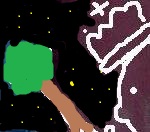Statement of Prejudice: Not much. Aware of her being around for a long time and being the National Poet of Wales, but haven’t read her work.
Reality: This is a good book of poetry. Unlike some of its TSE-contemporaries, Ice is clear-headed about its artistic goals and scores more than it misses. Clarke writes with the assurance and clarity of one deeply acquainted with her own writing voice, her account of the rural world both of her childhood and the present are invested with a sharp emotional edge you might expect from a collection named “Ice”, while some poems, like “Shearwaters on Enli”, “Polar” and “Nant Mill” brought to mind similar pieces from Heaney, Frost and Edward Thomas. Which is good.
It’s a difficult book to love, however, and I blame that as much on my urban-ironic-literary fashionable-oriented approach to reading as any flaw in the work. Clarke’s measured craftliness has more in common with Michael Longley than any of her shortlisted peers, and it’s unsurprising that one of her poems – the aforementioned “Shearwaters on Enli”, in which ‘I choose it as llatai, bird-messenger, sea-crier / for the poet of flight and song.’ – is dedicated to himself. And her poetry does find its feet, or more appropriately its wings, if you’ll permit, when the poem ventures into an imaginative register, capitalising on the hard work GC commits establishing the difficult facts of the physical environment.
The book progresses slowly, deliberately labouring its preoccupation with winter, death and the passage of time. The number of deaths from violence and neglect in the early passages are striking: the two murdered girls of “Freeze 1947” and “Freeze 2010” and ‘The tramp they found in a field / after the thaw. // When they lifted him, meltwater / streamed from his open mouth’ in “The Dead after the Thaw”, which I won’t forget in a hurry. Flowing water from a dead tongue seems to find its apical point in “Nant Mill”, which acknowledges the passing of traditional rural life and the neglect of the Welsh language in the same dignified, sacramental, but noticeably secular/pre-Christian tone employed in Heaney’s earlier books: GC refers liberally to the Mabinogi mythical cycle throughout Ice, but not at all to modern religion.
Also like famous Seamus, GC also economically employs fragments of her native tongue, most effectively in “Glas” and “Gleision”, the singular and plural forms of a word that means ‘blue or green’ and is the root of the word glass, which on its own is a pretty and evocative trivium, but in the book is set impressively to work. In “Glas”, the word becomes like Heaney’s omphalos, ‘an arterial stream to every tap, // like those rivers, reservoirs, aquifers underground, / invisible slivers silent as ultrasound’ (stick that in your syllabus and study it); while “Gleision” refers to a mining accident in 2011 that killed four men, noticeably also ‘in the hill’s dark hollowed heart’. The inner life of Wales and the Welsh language, figured literally in the second poem, is irrevocably tied to violent death, as much now as in 1947.
The drawback of this focus on the past is that it appears to have little to say to the present: one particularly failed poem, “Blue Sky Thinking”, is an exhortation for the business travel industry to ‘ground the planes for a while’, which ends with the total negation of ‘No mark, no plane-trail, jet-growl anywhere’. The line is almost touching, but comes across as curmudgeonly and naive where the more impressive imaginative project would be to reconcile the necessity of modern life with the equally valid necessity of preserving the only home we’ll ever have. The book is in awe of the natural world, but its rejection of modern life, though understandable in an author born in 1937, misses the chance to say something truly unique. Readers might find the repeated trope of wives waiting at home for their mining husbands, the ‘heroes’ of Gleision, difficult to swallow.
A number of poems towards the back of the collection seem to have been added in as a kind of published-elsewhere-miscellany of commissions and occasional pieces, and this might be an instance where dividing the book into sections could have benefitted the whole. And as you might have gathered, GC is at times as restricted by her influences as bolstered by them.
Tl;dr: This is a strong-minded, compassionate and well-composed book of poetry, but it breaks very little ground in either content or tone, and often lacks the engaging personality of her immediate contemporaries. That said, of the current batch of poets laureate, Clarke is ahead by a country mile, and Ice should be lauded for confronting some unpleasant realities in poems that are unlikely to be requisitioned by the Welsh Tourist Board.


